Beth Revis's Blog, page 14
February 10, 2014
Variety is the Spice of Life: Of Being Tired of the Same, and Demanding Different
Recently on Twitter, the lovely and smart Kim Welchons posted about the upcoming movie Monuments Men, and it really struck a chord with me.

First, let me say that I'm actually really looking forward to this movie. It's about art, and saving art, and high stakes, and it hits all the right notes with me--I'm totally going to see this movie.
But...when I search "how many WWII movies are there," I'm given an entire Wikipedia page dedicated to the topic, and a list of hundreds of films.
Now, this is obviously a popular topic--and one that I, personally, really like. I am fascinated by WWII, have studied it, it has influenced my writing, and I'm currently planning a trip that will include some WWII sites in it.
But...when I search "how many Boxer Rebellion movies are there," I get a PBS documentary and a 1976 movie in my Google search. There are a lot of wars that didn't involve America, but I bet if you added up all the movies about them, it still wouldn't add up to the number of movies about WWII.
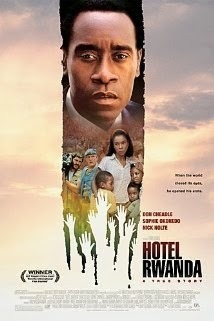 Likewise--and please do not think I'm belittling the topic, simply talking about numbers--there are several films about the Holocaust. Among them are some of my favorite films of all time, and I consider Schindler's List to be a true masterpiece. But there aren't any films at all about the Armenian Genocide. And, aside from Hotel Rwanda, there's little about the Hutu and Tutsi conflict. There's been no film about Darfur, either, or countless other equally atrocious moments in history.
Likewise--and please do not think I'm belittling the topic, simply talking about numbers--there are several films about the Holocaust. Among them are some of my favorite films of all time, and I consider Schindler's List to be a true masterpiece. But there aren't any films at all about the Armenian Genocide. And, aside from Hotel Rwanda, there's little about the Hutu and Tutsi conflict. There's been no film about Darfur, either, or countless other equally atrocious moments in history.
One of the reasons why I'm brining this up is because I used to be a teacher. I tied my unit on the Holocaust to a unit on Darfur specifically because most of my students believed that the Holocaust was a one-time thing. One blip, one moment in history where evil reigned. But that's not true. And ignoring the truth is a huge part of the problem.
Like it or not, our stories--movies, books, songs--influence our reality. After Inglorious Basterds came out, I cannot tell you the number of students who thought it portrayed reality. On the flip side of that coin, consider the number of people who thought Titanic was just a movie, not based on reality at all.
So--while I like the topic of The Monuments Men and plan on seeing it, I also want to see something...different. Something not done over and over and over again.
But it's hard to see that happening any time soon. We are constantly being fed a stream of the typical story. Even when it's something different, it's often framed in a few classic tropes. You can see this in the way we're marketed to--and make no mistake, movie posters are marketing tools. When I do a Google search of simply "movie posters," this is the first page that pops up:

So we have a blue person, two African American men, a bee, a dinosaur, and the rest are white people. Let's ignore the fact that nearly everyone involved in the movies with the blue people, bees, and dinosaurs are white.
Let's also look at setting. We have one movie that takes place on a different planet, one in Scotland, a couple in various locations that move around, and the rest are set in America (with the possible exception of Oblivion, which I've not seen).
I am not saying these movies are bad. Some of my favorite movies are in the posters above. I'm just saying...I'm tired. I'm tired of seeing the same thing over and over and over again.
And it's not just me. As Gizmodo published, lots of movies look, basically, the same.

I'm happy to say that more and more people are seeing this (including myself--I make no claims to have always been an advocate for "different"). When the recent Superman movie was announced in the wake of The Avengers, one of the first cries of protest was: "Why no Wonder Woman? Why no Black Widow?"
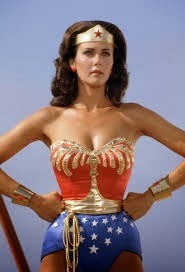 A reasonable claim. Here's a list of dozens of superhero movies, all starring a white male superhero. Sure, there are about five that feature female leads, a few with ethnic characters in starring roles (although, typically, as a villain). But there are eleven Batman movies and six Superman movies (with one more currently in production). Wonder Woman--a part of the Justice League and just as popular as Batman and Superman has none. None. Spiderman got a reboot of his entire franchise within a few years, and we haven't had any Wonder Woman movie since ever. Black Widow has an epic past and is an entirely awesome part of the Avengers. And while there are two Thor movies, three Iron Man movies, a few Hulk movies (although not a part of this cast), two Captain America movies (and another in the works), no Hawkeye movies, and no Black Widow movies. So of the Avengers, there are seven movies with the current casts featuring the white boys, and no movies featuring the woman, and no character who's not white.
A reasonable claim. Here's a list of dozens of superhero movies, all starring a white male superhero. Sure, there are about five that feature female leads, a few with ethnic characters in starring roles (although, typically, as a villain). But there are eleven Batman movies and six Superman movies (with one more currently in production). Wonder Woman--a part of the Justice League and just as popular as Batman and Superman has none. None. Spiderman got a reboot of his entire franchise within a few years, and we haven't had any Wonder Woman movie since ever. Black Widow has an epic past and is an entirely awesome part of the Avengers. And while there are two Thor movies, three Iron Man movies, a few Hulk movies (although not a part of this cast), two Captain America movies (and another in the works), no Hawkeye movies, and no Black Widow movies. So of the Avengers, there are seven movies with the current casts featuring the white boys, and no movies featuring the woman, and no character who's not white.
Let's step away from superheroes for a moment. Let's look at spies--a topic that I really like. James Bond is the epitome of spies. And it shows: there are twenty-three feature films about James Bond. Twenty-three. A fictional character who is the definition of awesome.
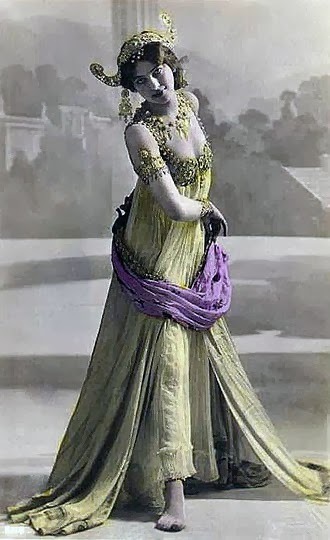 And yet...there's also Mata Hari, a real-life person who was way more bad-ass, and she has...wait for it...two films. One in 1931 and one in 1985.
And yet...there's also Mata Hari, a real-life person who was way more bad-ass, and she has...wait for it...two films. One in 1931 and one in 1985.
I do not at all want to take away from the movies--and books and other stories--that exist. I like most of the very movies I'm talking about in this post. It's not about subtraction--I don't want to take them away.
It's about addition. I want more. I demand more. I demand stories that don't take place in America. I demand stories that feature someone other than a white male. I demand stories that show me something I have never seen before, that make me think something I've never thought before, that show me the world is so much bigger than my very, very limited experience.
This week, I'll be featuring authors and readers who feel the same way as I do on this subject. And then throughout the next month, I'll be featuring authors who chose a different setting for their works, who have their eye on developing a story that is, in a word, different.
Further Reading:
Shaun Hutchinson, "The World Isn't One Color"Brooklyn Arden, "In Defense of CBC Diversity and on the Complexities of Publishing Diverse Books"School Library Journal, "Embracing Diversity in YA Lit"Reddit AMA on Diversity in YA LitDisability in KidLit BlogDiversity in YA Blog

First, let me say that I'm actually really looking forward to this movie. It's about art, and saving art, and high stakes, and it hits all the right notes with me--I'm totally going to see this movie.
But...when I search "how many WWII movies are there," I'm given an entire Wikipedia page dedicated to the topic, and a list of hundreds of films.
Now, this is obviously a popular topic--and one that I, personally, really like. I am fascinated by WWII, have studied it, it has influenced my writing, and I'm currently planning a trip that will include some WWII sites in it.
But...when I search "how many Boxer Rebellion movies are there," I get a PBS documentary and a 1976 movie in my Google search. There are a lot of wars that didn't involve America, but I bet if you added up all the movies about them, it still wouldn't add up to the number of movies about WWII.
 Likewise--and please do not think I'm belittling the topic, simply talking about numbers--there are several films about the Holocaust. Among them are some of my favorite films of all time, and I consider Schindler's List to be a true masterpiece. But there aren't any films at all about the Armenian Genocide. And, aside from Hotel Rwanda, there's little about the Hutu and Tutsi conflict. There's been no film about Darfur, either, or countless other equally atrocious moments in history.
Likewise--and please do not think I'm belittling the topic, simply talking about numbers--there are several films about the Holocaust. Among them are some of my favorite films of all time, and I consider Schindler's List to be a true masterpiece. But there aren't any films at all about the Armenian Genocide. And, aside from Hotel Rwanda, there's little about the Hutu and Tutsi conflict. There's been no film about Darfur, either, or countless other equally atrocious moments in history.One of the reasons why I'm brining this up is because I used to be a teacher. I tied my unit on the Holocaust to a unit on Darfur specifically because most of my students believed that the Holocaust was a one-time thing. One blip, one moment in history where evil reigned. But that's not true. And ignoring the truth is a huge part of the problem.
Like it or not, our stories--movies, books, songs--influence our reality. After Inglorious Basterds came out, I cannot tell you the number of students who thought it portrayed reality. On the flip side of that coin, consider the number of people who thought Titanic was just a movie, not based on reality at all.
So--while I like the topic of The Monuments Men and plan on seeing it, I also want to see something...different. Something not done over and over and over again.
But it's hard to see that happening any time soon. We are constantly being fed a stream of the typical story. Even when it's something different, it's often framed in a few classic tropes. You can see this in the way we're marketed to--and make no mistake, movie posters are marketing tools. When I do a Google search of simply "movie posters," this is the first page that pops up:

So we have a blue person, two African American men, a bee, a dinosaur, and the rest are white people. Let's ignore the fact that nearly everyone involved in the movies with the blue people, bees, and dinosaurs are white.
Let's also look at setting. We have one movie that takes place on a different planet, one in Scotland, a couple in various locations that move around, and the rest are set in America (with the possible exception of Oblivion, which I've not seen).
I am not saying these movies are bad. Some of my favorite movies are in the posters above. I'm just saying...I'm tired. I'm tired of seeing the same thing over and over and over again.
And it's not just me. As Gizmodo published, lots of movies look, basically, the same.

I'm happy to say that more and more people are seeing this (including myself--I make no claims to have always been an advocate for "different"). When the recent Superman movie was announced in the wake of The Avengers, one of the first cries of protest was: "Why no Wonder Woman? Why no Black Widow?"
 A reasonable claim. Here's a list of dozens of superhero movies, all starring a white male superhero. Sure, there are about five that feature female leads, a few with ethnic characters in starring roles (although, typically, as a villain). But there are eleven Batman movies and six Superman movies (with one more currently in production). Wonder Woman--a part of the Justice League and just as popular as Batman and Superman has none. None. Spiderman got a reboot of his entire franchise within a few years, and we haven't had any Wonder Woman movie since ever. Black Widow has an epic past and is an entirely awesome part of the Avengers. And while there are two Thor movies, three Iron Man movies, a few Hulk movies (although not a part of this cast), two Captain America movies (and another in the works), no Hawkeye movies, and no Black Widow movies. So of the Avengers, there are seven movies with the current casts featuring the white boys, and no movies featuring the woman, and no character who's not white.
A reasonable claim. Here's a list of dozens of superhero movies, all starring a white male superhero. Sure, there are about five that feature female leads, a few with ethnic characters in starring roles (although, typically, as a villain). But there are eleven Batman movies and six Superman movies (with one more currently in production). Wonder Woman--a part of the Justice League and just as popular as Batman and Superman has none. None. Spiderman got a reboot of his entire franchise within a few years, and we haven't had any Wonder Woman movie since ever. Black Widow has an epic past and is an entirely awesome part of the Avengers. And while there are two Thor movies, three Iron Man movies, a few Hulk movies (although not a part of this cast), two Captain America movies (and another in the works), no Hawkeye movies, and no Black Widow movies. So of the Avengers, there are seven movies with the current casts featuring the white boys, and no movies featuring the woman, and no character who's not white.Let's step away from superheroes for a moment. Let's look at spies--a topic that I really like. James Bond is the epitome of spies. And it shows: there are twenty-three feature films about James Bond. Twenty-three. A fictional character who is the definition of awesome.
 And yet...there's also Mata Hari, a real-life person who was way more bad-ass, and she has...wait for it...two films. One in 1931 and one in 1985.
And yet...there's also Mata Hari, a real-life person who was way more bad-ass, and she has...wait for it...two films. One in 1931 and one in 1985.I do not at all want to take away from the movies--and books and other stories--that exist. I like most of the very movies I'm talking about in this post. It's not about subtraction--I don't want to take them away.
It's about addition. I want more. I demand more. I demand stories that don't take place in America. I demand stories that feature someone other than a white male. I demand stories that show me something I have never seen before, that make me think something I've never thought before, that show me the world is so much bigger than my very, very limited experience.
This week, I'll be featuring authors and readers who feel the same way as I do on this subject. And then throughout the next month, I'll be featuring authors who chose a different setting for their works, who have their eye on developing a story that is, in a word, different.
Further Reading:
Shaun Hutchinson, "The World Isn't One Color"Brooklyn Arden, "In Defense of CBC Diversity and on the Complexities of Publishing Diverse Books"School Library Journal, "Embracing Diversity in YA Lit"Reddit AMA on Diversity in YA LitDisability in KidLit BlogDiversity in YA Blog

Published on February 10, 2014 09:36
February 5, 2014
The Thing That Means the Most...
...has always been my father's pride. This is a commercial for South African scotch, but it hit me right in the feels. The most important reader to me is my father. Reading kissing scenes from YA novels isn't exactly his cup of tea, but I'm so, so, so glad he does it for me. (Found via Mitali Perkins)

Published on February 05, 2014 10:22
January 27, 2014
Booktalk Nation Interview with Andrea Cremer
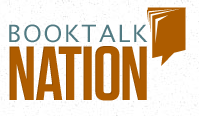 I am so excited to about my interview with Andrea on Tuesday! For those of you who don't know, here are the details:
I am so excited to about my interview with Andrea on Tuesday! For those of you who don't know, here are the details:WHEN: Tuesday, January 28th, at 7pm EST
WHO: Me and Andrea Cremer, author of SNAKEROOT
WHERE: Online! Through Booktalk Nation
WHAT: An online interview open to the public, live as it's happening. I'll be interviewing Andrea for the first half, and then we'll open it up to other questions from everyone watching--so YOU can participate in the interview.
ALSO! You can order signed books from both Andrea and I through Booktalk Nation.
Reasons why this is super cool and you should participate:
Short of attending a live event, it's often rare to get a chance to see authors in person, not just through the written word.And you get to participate! Half the questions will be from you, the audience. This really is just like being at a live event. Except you get to stay home and wear sweatpants and pick your nose and NO ONE will know because you're in the comfort of your own home.We're going to be talking about all the nerdy book stuff that I know you LOVE because you're cool like that.I don't promise to behave.I hope to see you there! And if not, the interview will be available online afterwards. But YOU SHOULD TOTALLY COME HANG OUT ONLINE WITH US YO.

Published on January 27, 2014 19:13
January 24, 2014
On the Value of a Book, Sunk Costs, and Being Ready to Publish or Trunk
I'm at the point where I figure basically everyone I know knows that I wrote ten trunk novels before getting my eleventh book published. I'm not ashamed of this fact--actually, I think it's important for people to know that often, "overnight successes" are really a decade + an overnight success. But perhaps because I have so many trunk novels, I've been hearing a lot of the same question, couched in different words:
When did you know to quit working on a book?When do you know when a book is ready?When do you trunk a novel and move on to the next?
The problem, of course, is that there's no answer to this. It's not like I can say, "invest exactly THIS much time, and you're done!" This isn't true of nearly anything at all.
Across the Universe was one of the easiest books for me to write, and I got paid exactly the same amount to write it as Shades of Earth, which was the hardest book for me to write. The editing and rewriting phase for Across the Universe took me about five months, but the editing/rewriting for my new book have taken twice as long...so far. Is one book better than the other? Nope. Much like a mother with children, I love them all equally, regardless of the labor time. (Pregnancy pun!)
Perhaps if I invested more time and energy into any of my trunked novels (something my mother would very much like me to do; her favorite of my books is one that's not published), one of those trunked novels would be worth publication. But I have decided that it's not worth my time. For each of those novels, I invested at least a year in writing and critiquing and editing. I treated writing as a job during that time--I basically considered myself to be working two jobs during that time, even though I was only getting paid for one of them. I probably spent around a hundred dollars each for printing costs and a hundred more for postage and mailing materials to send to agents. Several thousand in attending conferences (two of which I attended specifically to pitch my books to agents). Nearly a thousand in paying for critiques from publishing professionals.
I hate math, but let's add this out:
$100 in printing costs X 10 novels = $1000$100 in postage costs X 10 novels = $1000$3500 in attending conferences $1000 in paid critiques
10 years x $50,000 (close to the median income of an American citizen) for the time spent working this job = $500,000
For a grand total of: $506,500
I spent more than half a million dollars (in time and materials) on ten trunk novels that have never--and probably will never--sell.
I recently came across an economics term that sums this all up rather well: sunk costs.
Sunk cost is the amount of money something costs you to do. If you want to bake a cake, your sunk costs is the money spent on the ingredients required to make it. Your prospective costs is what you'll make when you sell it. Hopefully, you gain more than you lose. So if it costs you $5 to bake a cake, and you sell it for $10, you did good. But if it costs $5 and you sell it for $2, then you lost money.
The sunk costs for my trunk novels is: $506,500.
The prospective costs for my trunk novels is: $0.
That's a rough number to face. And I think I should add that despite the fact that I'm more than half a mil in the hole with those numbers, I do not think that it's a waste--they were each learning experiences, and it can absolutely be argued that, much like paying for a higher education, they were investments in my future.
But that's not what this post is about. This post is about how and when I knew that a book's sunk costs were worth exactly so much and no more.
At the end of the day, after I invested time and money into each of my trunk novels, I...trunked them. I put them away. I consciously decided that they were no longer worth any more time or money.
So, when people ask me the questions I wrote out above:
When did you know to quit working on a book?When do you know when a book is ready?When do you trunk a novel and move on to the next?
What they're really asking is:
At what point do I accept the sunk costs of a novel as a loss and move on?
Unfortunately, there still isn't an answer. For me, I started out with the idea of giving myself a year a book. I wanted to write YA, and the YA market seemed to have authors releasing a book a year. I figured I should do the same, if I wanted that to be my career. So I started out knowing that one year would be my sunk cost. Not that it was always that neat--it's not like I gave myself exactly from January 1 to December 31 and no more, and it's not like it was easy to move on. But from the start, I did give myself permission to accept the sunk costs and move on, and that was the defining attitude of accepting my trunk novels and the fact they weren't worthy of publication. As I've said many times before: knowing your goal and striving for that without settling for less is hugely important. My goal was a career in writing, not one specific book published.
I do have a word of warning, though:
Do NOT let the sunk costs keep you from moving on.
Writers are very, very often told not to query too early. Particularly after NaNoWriMo, it becomes almost a mantra on every agent's blog: don't query too early. Take the time to let the novel rest, edit, revise, get crits, edit again, etc., etc., etc.
But too often, writers are never told not to take too long. Some--not all, but some--writers sink into a spiraling time-suck of rewriting, revising, and tweaking the same novel, over and over and over. I think they start to feel that their sunk costs are too high--they've invested so much time, and so much money into this one novel that they feel they can't move on, they can't let it all be a waste.
And that's where the danger lies: when you stagnate.
There are some authors out there that don't know when to let go. You revise and revise and revise and tweak and fiddle and...the book still isn't good enough. But you can't just drop it--you've invested so much into it!
If you're in this position, you need to evaluate yourself and your work. Are you holding onto the idea of the novel, the beating heart of the story that you love? Or are you holding onto your sunk costs?
Recently, the husband and I went to a store that sells local art. There was a stick. The stick was painted with sketchy drawings and words. It was...well, it was an ugly stick. I could see what the artist was trying to do, but...it was a stick. With paint on it. The woman who owned the store raved about how long it takes this artist to paint the stick. And the price tag on it reflected that: $300. For a painted stick. For a painted stick that wasn't really painted that well.
The artist was obviously trying to recoup for sunk costs. She spent so much time making this, and she put a value on the time, not the object.
This happens with writing, too. We work on an idea so much that it can't possibly be trunked. But every author--published or not--must consider when a novel's purpose was to be published versus when a novel's purpose was for the author to gain experience.
Your work has value. But sometimes the value is in what you learned, not what money you gained.
Even now, with a few published novels and a new contract under my belt, I still struggle with sunk costs. At what point should I stop trying to make an idea that doesn't work, work? Some of this is about art and integrity--I of course want to make an idea be the right idea, and produce the right work of art to go with it. But some of it is also about economics: no matter what you do, whether it be creating art or baking a cake, you need to be aware of your sunk costs, and be willing to know when you have to cut those losses and move on.
When did you know to quit working on a book?When do you know when a book is ready?When do you trunk a novel and move on to the next?
The problem, of course, is that there's no answer to this. It's not like I can say, "invest exactly THIS much time, and you're done!" This isn't true of nearly anything at all.
Across the Universe was one of the easiest books for me to write, and I got paid exactly the same amount to write it as Shades of Earth, which was the hardest book for me to write. The editing and rewriting phase for Across the Universe took me about five months, but the editing/rewriting for my new book have taken twice as long...so far. Is one book better than the other? Nope. Much like a mother with children, I love them all equally, regardless of the labor time. (Pregnancy pun!)
Perhaps if I invested more time and energy into any of my trunked novels (something my mother would very much like me to do; her favorite of my books is one that's not published), one of those trunked novels would be worth publication. But I have decided that it's not worth my time. For each of those novels, I invested at least a year in writing and critiquing and editing. I treated writing as a job during that time--I basically considered myself to be working two jobs during that time, even though I was only getting paid for one of them. I probably spent around a hundred dollars each for printing costs and a hundred more for postage and mailing materials to send to agents. Several thousand in attending conferences (two of which I attended specifically to pitch my books to agents). Nearly a thousand in paying for critiques from publishing professionals.
I hate math, but let's add this out:
$100 in printing costs X 10 novels = $1000$100 in postage costs X 10 novels = $1000$3500 in attending conferences $1000 in paid critiques
10 years x $50,000 (close to the median income of an American citizen) for the time spent working this job = $500,000
For a grand total of: $506,500
I spent more than half a million dollars (in time and materials) on ten trunk novels that have never--and probably will never--sell.
I recently came across an economics term that sums this all up rather well: sunk costs.
In economics and business decision-making, a sunk cost is a retrospective (past) cost that has already been incurred and cannot be recovered. Sunk costs are sometimes contrasted with prospective costs, which are future costs that may be incurred or changed if an action is taken.In layman's terms, this basically means:
Sunk cost is the amount of money something costs you to do. If you want to bake a cake, your sunk costs is the money spent on the ingredients required to make it. Your prospective costs is what you'll make when you sell it. Hopefully, you gain more than you lose. So if it costs you $5 to bake a cake, and you sell it for $10, you did good. But if it costs $5 and you sell it for $2, then you lost money.
The sunk costs for my trunk novels is: $506,500.
The prospective costs for my trunk novels is: $0.
That's a rough number to face. And I think I should add that despite the fact that I'm more than half a mil in the hole with those numbers, I do not think that it's a waste--they were each learning experiences, and it can absolutely be argued that, much like paying for a higher education, they were investments in my future.
But that's not what this post is about. This post is about how and when I knew that a book's sunk costs were worth exactly so much and no more.
At the end of the day, after I invested time and money into each of my trunk novels, I...trunked them. I put them away. I consciously decided that they were no longer worth any more time or money.
So, when people ask me the questions I wrote out above:
When did you know to quit working on a book?When do you know when a book is ready?When do you trunk a novel and move on to the next?
What they're really asking is:
At what point do I accept the sunk costs of a novel as a loss and move on?
Unfortunately, there still isn't an answer. For me, I started out with the idea of giving myself a year a book. I wanted to write YA, and the YA market seemed to have authors releasing a book a year. I figured I should do the same, if I wanted that to be my career. So I started out knowing that one year would be my sunk cost. Not that it was always that neat--it's not like I gave myself exactly from January 1 to December 31 and no more, and it's not like it was easy to move on. But from the start, I did give myself permission to accept the sunk costs and move on, and that was the defining attitude of accepting my trunk novels and the fact they weren't worthy of publication. As I've said many times before: knowing your goal and striving for that without settling for less is hugely important. My goal was a career in writing, not one specific book published.
I do have a word of warning, though:
Do NOT let the sunk costs keep you from moving on.
Writers are very, very often told not to query too early. Particularly after NaNoWriMo, it becomes almost a mantra on every agent's blog: don't query too early. Take the time to let the novel rest, edit, revise, get crits, edit again, etc., etc., etc.
But too often, writers are never told not to take too long. Some--not all, but some--writers sink into a spiraling time-suck of rewriting, revising, and tweaking the same novel, over and over and over. I think they start to feel that their sunk costs are too high--they've invested so much time, and so much money into this one novel that they feel they can't move on, they can't let it all be a waste.
And that's where the danger lies: when you stagnate.
There are some authors out there that don't know when to let go. You revise and revise and revise and tweak and fiddle and...the book still isn't good enough. But you can't just drop it--you've invested so much into it!
If you're in this position, you need to evaluate yourself and your work. Are you holding onto the idea of the novel, the beating heart of the story that you love? Or are you holding onto your sunk costs?
Recently, the husband and I went to a store that sells local art. There was a stick. The stick was painted with sketchy drawings and words. It was...well, it was an ugly stick. I could see what the artist was trying to do, but...it was a stick. With paint on it. The woman who owned the store raved about how long it takes this artist to paint the stick. And the price tag on it reflected that: $300. For a painted stick. For a painted stick that wasn't really painted that well.
The artist was obviously trying to recoup for sunk costs. She spent so much time making this, and she put a value on the time, not the object.
This happens with writing, too. We work on an idea so much that it can't possibly be trunked. But every author--published or not--must consider when a novel's purpose was to be published versus when a novel's purpose was for the author to gain experience.
Your work has value. But sometimes the value is in what you learned, not what money you gained.
Even now, with a few published novels and a new contract under my belt, I still struggle with sunk costs. At what point should I stop trying to make an idea that doesn't work, work? Some of this is about art and integrity--I of course want to make an idea be the right idea, and produce the right work of art to go with it. But some of it is also about economics: no matter what you do, whether it be creating art or baking a cake, you need to be aware of your sunk costs, and be willing to know when you have to cut those losses and move on.

Published on January 24, 2014 18:25
January 23, 2014
Cover Reveal & Giveaway for Elana Johnson's ELEVATED!
I am so excited to have a new Elana book! Elana is a dear friend of mine, and her new book, ELEVATED sound wonderful. Read on to the end of this post for a giveaway!

Buy Links:Kobo: http://store.kobobooks.com/en-US/ebook/elevated iTunes: coming soon!
Amazon: coming soon!On Goodreads: https://www.goodreads.com/book/show/18947183-elevated
Praise for ELEVATED:"ELEVATED will take you on an emotionally gripping journey through the highs and lows of first love."~Carolee Dean, author of Take Me There and Forget Me Not
"Poignant, raw, and intense, ELEVATED is a novel that will grip your heart and linger in your mind long after you turn the last page."~Stasia Ward Kehoe, author of Audition and The Sound of Letting Go
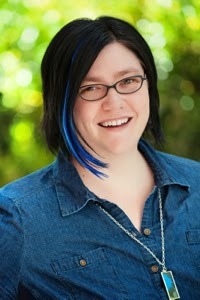 About Elana Johnson: Elana Johnson’s work, including Possession, Surrender, Abandon, and Regret, published by Simon Pulse (Simon & Schuster), is available now everywhere books are sold. Her popular ebook, From the Query to the Call, is also available for download, as well as a Possession short story, Resist. School teacher by day, Query Ninja by night, you can find her online at her personal blog or Twitter. She also co-founded the Query Tracker blog, and contributes to the League of Extraordinary Writers.
About Elana Johnson: Elana Johnson’s work, including Possession, Surrender, Abandon, and Regret, published by Simon Pulse (Simon & Schuster), is available now everywhere books are sold. Her popular ebook, From the Query to the Call, is also available for download, as well as a Possession short story, Resist. School teacher by day, Query Ninja by night, you can find her online at her personal blog or Twitter. She also co-founded the Query Tracker blog, and contributes to the League of Extraordinary Writers.
Social Media Links:Website/blog: http://elanajohnson.blogspot.com/ Twitter: https://twitter.com/ElanaJ Facebook: https://www.facebook.com/possessionthebook Tumblr: http://elanajohnson.tumblr.com/ Wattpad: http://www.wattpad.com/user/elanajohnson League of Extraordinary Writers: http://leaguewriters.blogspot.com/ WriteOnCon: http://writeoncon.com/ Elana on Goodreads: https://www.goodreads.com/author/show/4044383.Elana_Johnson
a Rafflecopter giveaway

About ELEVATED: The last person seventeen-year-old Eleanor Livingston wants to see on the elevator—let alone get stuck with—is her ex-boyfriend Travis, the guy she's been avoiding for five months.
Plagued with the belief that when she speaks the truth, bad things happen, Elly hasn’t told Trav anything. Not why she broke up with him and cut off all contact. Not what happened the day her father returned from his deployment to Afghanistan. And certainly not that she misses him and still thinks about him everyday.
But with nowhere to hide and Travis so close it hurts, Elly’s worried she won’t be able to contain her secrets for long. She’s terrified of finally revealing the truth, because she can’t bear to watch a tragedy befall the boy she still loves.Doesn't that sound awesome? Here's my top five E-words to describe how ready I am to read Elana's ELEVATEDElated!Excited!Eager!Ecstatic!Effervescent!Clearly, I need to read this book, like, yesterday. And just in case you need one more reason to nab this awesome new book, here's the beautiful cover:

Buy Links:Kobo: http://store.kobobooks.com/en-US/ebook/elevated iTunes: coming soon!
Amazon: coming soon!On Goodreads: https://www.goodreads.com/book/show/18947183-elevated
Praise for ELEVATED:"ELEVATED will take you on an emotionally gripping journey through the highs and lows of first love."~Carolee Dean, author of Take Me There and Forget Me Not
"Poignant, raw, and intense, ELEVATED is a novel that will grip your heart and linger in your mind long after you turn the last page."~Stasia Ward Kehoe, author of Audition and The Sound of Letting Go
 About Elana Johnson: Elana Johnson’s work, including Possession, Surrender, Abandon, and Regret, published by Simon Pulse (Simon & Schuster), is available now everywhere books are sold. Her popular ebook, From the Query to the Call, is also available for download, as well as a Possession short story, Resist. School teacher by day, Query Ninja by night, you can find her online at her personal blog or Twitter. She also co-founded the Query Tracker blog, and contributes to the League of Extraordinary Writers.
About Elana Johnson: Elana Johnson’s work, including Possession, Surrender, Abandon, and Regret, published by Simon Pulse (Simon & Schuster), is available now everywhere books are sold. Her popular ebook, From the Query to the Call, is also available for download, as well as a Possession short story, Resist. School teacher by day, Query Ninja by night, you can find her online at her personal blog or Twitter. She also co-founded the Query Tracker blog, and contributes to the League of Extraordinary Writers.Social Media Links:Website/blog: http://elanajohnson.blogspot.com/ Twitter: https://twitter.com/ElanaJ Facebook: https://www.facebook.com/possessionthebook Tumblr: http://elanajohnson.tumblr.com/ Wattpad: http://www.wattpad.com/user/elanajohnson League of Extraordinary Writers: http://leaguewriters.blogspot.com/ WriteOnCon: http://writeoncon.com/ Elana on Goodreads: https://www.goodreads.com/author/show/4044383.Elana_Johnson
a Rafflecopter giveaway

Published on January 23, 2014 21:00
January 17, 2014
Inspiration Shelf
There's an inset shelf built into my wall by my desk. For far too long, I've simply let it fill up with books--much like every other bookshelf in my house. But I've been thinking about turning it into something a little different, and slowly been gathering supplies. Contact paper for decoration, and--thanks to a generous husband Santa Claus, a few awesome decorations.
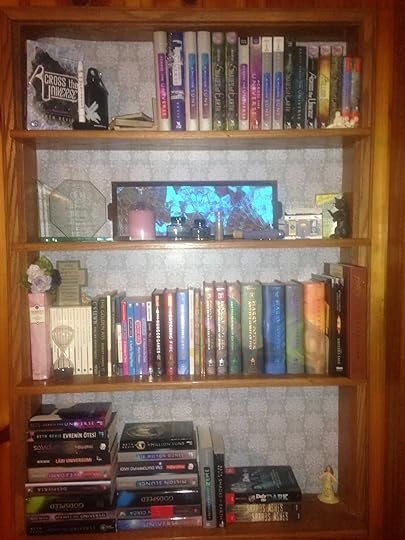
Here's my new shelf! Entirely lined with pretty paper. On the top shelf is a copy of each edition of each of my books, and on the left...

My space corner! The Antares rocket was a gift from NASA when I attended the rocket launch last year. And that specific copy of Across the Universe was the one that went up into space!
Lots of people have asked me what happened to that book. It was mounted to a weather balloon and attached to a rig with a camera and a geo-locator. When the balloon popped, the crew found the book and camera thanks to the geo-locator, then Penguin was kind enough to send me the book! At which point I screamed with joy. The first thing I did? Sniff the pages. Mmmm, space pages.

On the second shelf is my Christmas presents this year, on display! I'm so happy to have gotten these. They're from a brilliant UK artist at Vinegar and Brown Paper, and I'd wanted them for ages.
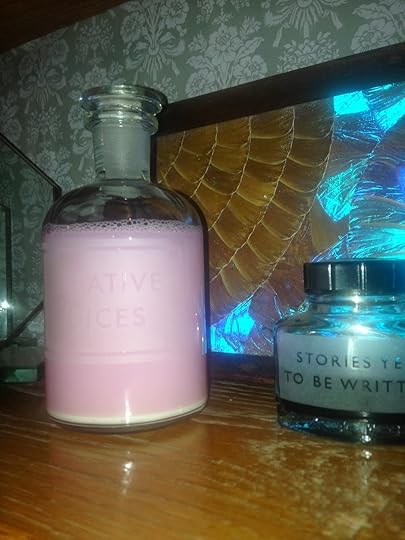
It's hard to read here because of my flash, but in the pink jar is "Creative Juices." (In reality, it's some slightly shimmery body spray, and when I need a bit of inspiration, I can actually use it as perfume!)

Here we have the centerpiece--two ink bottles, one labeled "Stories Yet to be Written," and another labeled "Keep Writing." I have a few calligrapher's pens I plan on placing around them later. And let's not forget "A Drop of Good Luck." Currently filled with plain glitter, but I might mix it with oil or something so it can be more liquidy.

And finally, a vial of "A Shot of Inspiration!" I've filled it with a jar of pigments from Coastal Scents, and it shines a slightly different color in different lights and angles.
Isn't it great?! The light here isn't the best, but in real life, the items really pop. I have them in front of a tray from my grandfather made of butterfly wings. The whole thing just makes me so happy to look at, and reminds to stay inspired.
And if that doesn't work, the shelves below this one help, too. The third shelf holds all my favorite and most inspiring books, and the fourth holds a copy of each foreign edition of my books that I have so far.
What do you think? Overall, I was trying to make a little display to just remind myself of the whimsy and joy of writing, to keep writing, and to remember that I have to refresh my well of creativity every once in awhile. Also, I think it's cool :)


Here's my new shelf! Entirely lined with pretty paper. On the top shelf is a copy of each edition of each of my books, and on the left...

My space corner! The Antares rocket was a gift from NASA when I attended the rocket launch last year. And that specific copy of Across the Universe was the one that went up into space!
Lots of people have asked me what happened to that book. It was mounted to a weather balloon and attached to a rig with a camera and a geo-locator. When the balloon popped, the crew found the book and camera thanks to the geo-locator, then Penguin was kind enough to send me the book! At which point I screamed with joy. The first thing I did? Sniff the pages. Mmmm, space pages.

On the second shelf is my Christmas presents this year, on display! I'm so happy to have gotten these. They're from a brilliant UK artist at Vinegar and Brown Paper, and I'd wanted them for ages.

It's hard to read here because of my flash, but in the pink jar is "Creative Juices." (In reality, it's some slightly shimmery body spray, and when I need a bit of inspiration, I can actually use it as perfume!)

Here we have the centerpiece--two ink bottles, one labeled "Stories Yet to be Written," and another labeled "Keep Writing." I have a few calligrapher's pens I plan on placing around them later. And let's not forget "A Drop of Good Luck." Currently filled with plain glitter, but I might mix it with oil or something so it can be more liquidy.

And finally, a vial of "A Shot of Inspiration!" I've filled it with a jar of pigments from Coastal Scents, and it shines a slightly different color in different lights and angles.
Isn't it great?! The light here isn't the best, but in real life, the items really pop. I have them in front of a tray from my grandfather made of butterfly wings. The whole thing just makes me so happy to look at, and reminds to stay inspired.
And if that doesn't work, the shelves below this one help, too. The third shelf holds all my favorite and most inspiring books, and the fourth holds a copy of each foreign edition of my books that I have so far.
What do you think? Overall, I was trying to make a little display to just remind myself of the whimsy and joy of writing, to keep writing, and to remember that I have to refresh my well of creativity every once in awhile. Also, I think it's cool :)

Published on January 17, 2014 17:30
January 10, 2014
On Being Alone and Not
One of my favorite authors is C.S. Lewis, but there's a quote by him that I just never really understood.
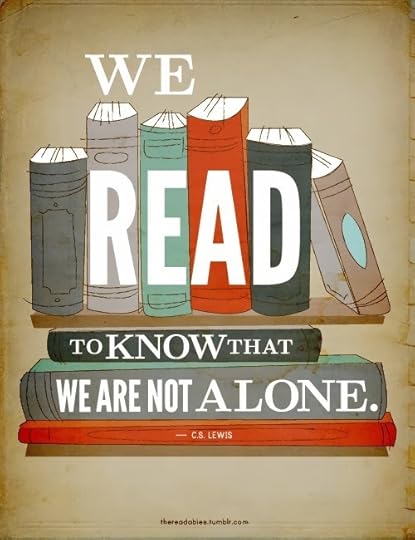 SourceI always thought it was a nice enough quote, but it didn't really make any sense to me. If you pressed me for an explanation, I think I would have said that books give us comfort when we're alone, or something nebulous like that.
SourceI always thought it was a nice enough quote, but it didn't really make any sense to me. If you pressed me for an explanation, I think I would have said that books give us comfort when we're alone, or something nebulous like that.
Recently, I stumbled across another quote, this one by Kurt Vonnegut.
 SourceAnd suddenly I understood what C.S. Lewis meant about not being alone in a very real, visceral way.
SourceAnd suddenly I understood what C.S. Lewis meant about not being alone in a very real, visceral way.
Let me back up a bit. Recently, I've been visiting the confessional website Emotional Baggage Check. The concept behind this site is simple. You can "check baggage," and leave a message about something that's bothering you, whatever emotional baggage you might have. Or you can "carry baggage," and reply to someone else's baggage with an encouraging note and a link to a song. It's all anonymous, so no one knows anyone's names at all.
After reading message after message from people, I realized two things. One, people have an inherent need to confess--not just sins, but also sorrow. A confession is a release. But the second thing I learned was that most people feel they are alone, at least in some aspect of their lives. Many of the confessions explicitly state that--they feel they have no one else they can tell this secret, so they share it online. You can see a similar experience with the hugely popular Post Secret project.
It is important for people to know that they are not alone. That's what Lewis was saying, and Vonnegut. That's the point of Emotional Baggage and Post Secret. I inadvertently touched on it in my post about representation, but then I was thinking in terms of physical appearance. But it's just as important for people to know that they are not alone in the way they feel, the secrets they keep. The anxiety, the fear, the sorrow--you are not alone in it. If you learn that from a character in a book or a stranger online or a friend or a lover or a chance meeting on the train or a child--the thing to remember is that, simply, you are not alone.
And that one idea--you are not alone--is a deep truth, and realizing that truth can change everything.
 SourceI always thought it was a nice enough quote, but it didn't really make any sense to me. If you pressed me for an explanation, I think I would have said that books give us comfort when we're alone, or something nebulous like that.
SourceI always thought it was a nice enough quote, but it didn't really make any sense to me. If you pressed me for an explanation, I think I would have said that books give us comfort when we're alone, or something nebulous like that. Recently, I stumbled across another quote, this one by Kurt Vonnegut.
 SourceAnd suddenly I understood what C.S. Lewis meant about not being alone in a very real, visceral way.
SourceAnd suddenly I understood what C.S. Lewis meant about not being alone in a very real, visceral way. Let me back up a bit. Recently, I've been visiting the confessional website Emotional Baggage Check. The concept behind this site is simple. You can "check baggage," and leave a message about something that's bothering you, whatever emotional baggage you might have. Or you can "carry baggage," and reply to someone else's baggage with an encouraging note and a link to a song. It's all anonymous, so no one knows anyone's names at all.
After reading message after message from people, I realized two things. One, people have an inherent need to confess--not just sins, but also sorrow. A confession is a release. But the second thing I learned was that most people feel they are alone, at least in some aspect of their lives. Many of the confessions explicitly state that--they feel they have no one else they can tell this secret, so they share it online. You can see a similar experience with the hugely popular Post Secret project.
It is important for people to know that they are not alone. That's what Lewis was saying, and Vonnegut. That's the point of Emotional Baggage and Post Secret. I inadvertently touched on it in my post about representation, but then I was thinking in terms of physical appearance. But it's just as important for people to know that they are not alone in the way they feel, the secrets they keep. The anxiety, the fear, the sorrow--you are not alone in it. If you learn that from a character in a book or a stranger online or a friend or a lover or a chance meeting on the train or a child--the thing to remember is that, simply, you are not alone.
And that one idea--you are not alone--is a deep truth, and realizing that truth can change everything.

Published on January 10, 2014 09:11
January 7, 2014
Don't Be Afraid of Change
I wrote ten novels over the course of ten years before my eleventh novel sold. Each of the trunked ten novels were fantasy, and they were all written basically the same way: no outlining, but with an idea of the end, followed by minimal editing. All fantasy, all third person past tense.
I think the eleventh novel, Across the Universe, sold mostly because I tried something different—still no outlining, but also no real idea of what the end would be. And this was a science fiction novel, told in alternating first person present points of view. It was different for me, and it became the novel that changed everything.
After writing the sequels to Across the Universe, I realized that I needed another change. My method of writing meant a lot of rewriting, and it was killing my time. I could be more efficient, I knew that, I just wasn’t sure how.
So I read. I don’t really like a lot of writing self-help books, but I did like Blake Snyder’s Save the Cat, and Hague and Vogler’s DVD on the hero’s journey was great. I started to piece together a method that worked for me. For the current book I’m writing, coming in 2015, I still wrote without an outline—but I edited with an outline. I changed the method I wrote, too, using different features in Scrivener I’d previously ignored.
I’m also now writing a totally different book…at the same time as the current one. Different genre, different style, and different method of writing, relying on a notebook rather than a wall chart, and sketching out a bit of an outline as I go.
People would always tell me before that there’s a certain method each writer prefers, and you just have to find the way that works for you. But what no one really told me is that the method changes for the writer with each book—sometimes more than once in a single book. Outlines don’t help with some novels, but work for others. Editing takes different routes. Styles, tones, and tenses change. The writer changes.
Writing isn’t a static activity. It is constantly dynamic, constantly changing, and the best thing you can do is seek out the change rather than fear it. You’re not either an outliner or a pantser—you can be both, simultaneously, or one for one book and another for another.
Writing for the long haul isn’t about writing either/or. It’s about finding the best method for each story.
I think the eleventh novel, Across the Universe, sold mostly because I tried something different—still no outlining, but also no real idea of what the end would be. And this was a science fiction novel, told in alternating first person present points of view. It was different for me, and it became the novel that changed everything.
After writing the sequels to Across the Universe, I realized that I needed another change. My method of writing meant a lot of rewriting, and it was killing my time. I could be more efficient, I knew that, I just wasn’t sure how.
So I read. I don’t really like a lot of writing self-help books, but I did like Blake Snyder’s Save the Cat, and Hague and Vogler’s DVD on the hero’s journey was great. I started to piece together a method that worked for me. For the current book I’m writing, coming in 2015, I still wrote without an outline—but I edited with an outline. I changed the method I wrote, too, using different features in Scrivener I’d previously ignored.
I’m also now writing a totally different book…at the same time as the current one. Different genre, different style, and different method of writing, relying on a notebook rather than a wall chart, and sketching out a bit of an outline as I go.
People would always tell me before that there’s a certain method each writer prefers, and you just have to find the way that works for you. But what no one really told me is that the method changes for the writer with each book—sometimes more than once in a single book. Outlines don’t help with some novels, but work for others. Editing takes different routes. Styles, tones, and tenses change. The writer changes.
Writing isn’t a static activity. It is constantly dynamic, constantly changing, and the best thing you can do is seek out the change rather than fear it. You’re not either an outliner or a pantser—you can be both, simultaneously, or one for one book and another for another.
Writing for the long haul isn’t about writing either/or. It’s about finding the best method for each story.

Published on January 07, 2014 16:42
December 30, 2013
Year-end Review: Links and More!
I can hardly believe that 2013 is nearly over. This has been a year of stops and starts for me. I stopped writing in the Across the Universe world with the release of the last book in the trilogy, Shades of Earth. I started working on something else...and then something else...and then something else....and then something else. Then I stopped working on some of those projects...and then some of those projects sold (and others did not), so I started working on them again! You should be getting news of the fruition of that work fairly soon...
I'm looking forward to 2014. I'm looking forward to starting a new trilogy, exploring a new world. I'm looking forward to new challenges, and attempting to work on more than one book/world at a time. I plan on experimenting more with short work, and doing some things online--and off--that I've not done before.
2014 will hopefully be a year of change for me. But change is, above all else, terrifying. But wrapped around all that scary change is hope, and it's the hope I'm clinging to at the moment...
Anyway! Here's a collection of some of the recent things to distract you from the nauseous fear of a looming new year:
Also: most of this information is also going out in my newsletter at the end of the week. I'm going to strive to make my newsletter this year a monthly endeavor, with a collection of interesting things for everyone to read. If you're not already a subscriber, please consider signing up for it here!
Free Short Story
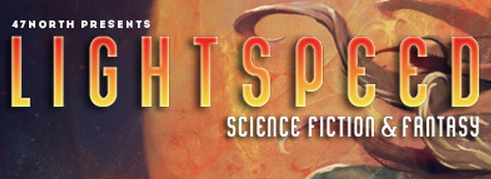
A short story of mine, "The Turing Test," was recently published in the online magazine, Lightspeed. The entire story is available online for free on the Lightspeed website. The story was inspire by the Turing Test, a test developed by Alan Turing to evaluate humanity in computers, such as androids. The New York Times recently did an amazing article on Turing that you can read in full here.
 Across the Universe was recently featured on the USA Today website. It was selected as a recommended sci fi read, and the reviewer said, "This has been one of the best YA sci-fi books I've read in a few years. Beth Revis also pulled the trilogy into an interesting plotline in the third book that I didn't see coming — and loved every moment." You can read about all the selections here.
Across the Universe was recently featured on the USA Today website. It was selected as a recommended sci fi read, and the reviewer said, "This has been one of the best YA sci-fi books I've read in a few years. Beth Revis also pulled the trilogy into an interesting plotline in the third book that I didn't see coming — and loved every moment." You can read about all the selections here.
 Huffington Post has had two great articles recently. The first, by Meagan Spooner and Amie Kaufman (authors of These Broken Stars) talks about "Why Everyone Should Read More Science Fiction." It touches on everything I believe in when it comes to SF and YA--how both are "universal to the human experience" and should be read by everyone. Also, the brilliant Lydia Kang (author of Control), wrote "Young Adult Sci Fi that will get Readers Psyched About Science," and I'm honored that Across the Universe made the list! Both these articles are really great; check them out!
Huffington Post has had two great articles recently. The first, by Meagan Spooner and Amie Kaufman (authors of These Broken Stars) talks about "Why Everyone Should Read More Science Fiction." It touches on everything I believe in when it comes to SF and YA--how both are "universal to the human experience" and should be read by everyone. Also, the brilliant Lydia Kang (author of Control), wrote "Young Adult Sci Fi that will get Readers Psyched About Science," and I'm honored that Across the Universe made the list! Both these articles are really great; check them out!
 I was honored to make my own list of must-read books for the LA Review of Books, as well as share the story of how I came to start writing YA Science Fiction in the first place. My list features some of my favorite recent YA SF books. You can read the entire article and see the list here.
I was honored to make my own list of must-read books for the LA Review of Books, as well as share the story of how I came to start writing YA Science Fiction in the first place. My list features some of my favorite recent YA SF books. You can read the entire article and see the list here.
 The League of Extraordinary Writers is undergoing some changes as well! We're moving to a more mobile front, with a monthly newsletter highlighting articles, a few new members to be announced soon, and a renewed focus. Make sure you don't miss a thing--this is the hub of all things YA & SF!
The League of Extraordinary Writers is undergoing some changes as well! We're moving to a more mobile front, with a monthly newsletter highlighting articles, a few new members to be announced soon, and a renewed focus. Make sure you don't miss a thing--this is the hub of all things YA & SF!

I would like to feature one new author a month with a specific story featuring the setting on their novel. If you're an author (or soon to be published), please fill out the form to be featured on my website and in my newsletter! Please direct all your author friends here! This new series will start next month.
 If you're an aspiring writer, make sure you're a member of the Reddit sub, YAWriters. I'm one of the mods there, and we have some big plans for the new year. You can always find new articles on YA writing there, and we hold regular crits. Joining is simple and free, and there's almost always someone online to help answer any questions you have about writing, publishing, and more.
If you're an aspiring writer, make sure you're a member of the Reddit sub, YAWriters. I'm one of the mods there, and we have some big plans for the new year. You can always find new articles on YA writing there, and we hold regular crits. Joining is simple and free, and there's almost always someone online to help answer any questions you have about writing, publishing, and more.
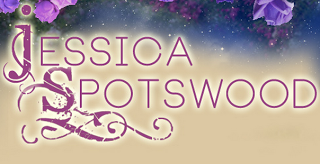
Speaking of advice for writers, my friend Jess Spotswood has an amazing article up right now about expectations. I think you should read it.

I'm looking forward to 2014. I'm looking forward to starting a new trilogy, exploring a new world. I'm looking forward to new challenges, and attempting to work on more than one book/world at a time. I plan on experimenting more with short work, and doing some things online--and off--that I've not done before.
2014 will hopefully be a year of change for me. But change is, above all else, terrifying. But wrapped around all that scary change is hope, and it's the hope I'm clinging to at the moment...
Anyway! Here's a collection of some of the recent things to distract you from the nauseous fear of a looming new year:
Also: most of this information is also going out in my newsletter at the end of the week. I'm going to strive to make my newsletter this year a monthly endeavor, with a collection of interesting things for everyone to read. If you're not already a subscriber, please consider signing up for it here!
Free Short Story

A short story of mine, "The Turing Test," was recently published in the online magazine, Lightspeed. The entire story is available online for free on the Lightspeed website. The story was inspire by the Turing Test, a test developed by Alan Turing to evaluate humanity in computers, such as androids. The New York Times recently did an amazing article on Turing that you can read in full here.
 Across the Universe was recently featured on the USA Today website. It was selected as a recommended sci fi read, and the reviewer said, "This has been one of the best YA sci-fi books I've read in a few years. Beth Revis also pulled the trilogy into an interesting plotline in the third book that I didn't see coming — and loved every moment." You can read about all the selections here.
Across the Universe was recently featured on the USA Today website. It was selected as a recommended sci fi read, and the reviewer said, "This has been one of the best YA sci-fi books I've read in a few years. Beth Revis also pulled the trilogy into an interesting plotline in the third book that I didn't see coming — and loved every moment." You can read about all the selections here. Huffington Post has had two great articles recently. The first, by Meagan Spooner and Amie Kaufman (authors of These Broken Stars) talks about "Why Everyone Should Read More Science Fiction." It touches on everything I believe in when it comes to SF and YA--how both are "universal to the human experience" and should be read by everyone. Also, the brilliant Lydia Kang (author of Control), wrote "Young Adult Sci Fi that will get Readers Psyched About Science," and I'm honored that Across the Universe made the list! Both these articles are really great; check them out!
Huffington Post has had two great articles recently. The first, by Meagan Spooner and Amie Kaufman (authors of These Broken Stars) talks about "Why Everyone Should Read More Science Fiction." It touches on everything I believe in when it comes to SF and YA--how both are "universal to the human experience" and should be read by everyone. Also, the brilliant Lydia Kang (author of Control), wrote "Young Adult Sci Fi that will get Readers Psyched About Science," and I'm honored that Across the Universe made the list! Both these articles are really great; check them out! I was honored to make my own list of must-read books for the LA Review of Books, as well as share the story of how I came to start writing YA Science Fiction in the first place. My list features some of my favorite recent YA SF books. You can read the entire article and see the list here.
I was honored to make my own list of must-read books for the LA Review of Books, as well as share the story of how I came to start writing YA Science Fiction in the first place. My list features some of my favorite recent YA SF books. You can read the entire article and see the list here.  The League of Extraordinary Writers is undergoing some changes as well! We're moving to a more mobile front, with a monthly newsletter highlighting articles, a few new members to be announced soon, and a renewed focus. Make sure you don't miss a thing--this is the hub of all things YA & SF!
The League of Extraordinary Writers is undergoing some changes as well! We're moving to a more mobile front, with a monthly newsletter highlighting articles, a few new members to be announced soon, and a renewed focus. Make sure you don't miss a thing--this is the hub of all things YA & SF!

I would like to feature one new author a month with a specific story featuring the setting on their novel. If you're an author (or soon to be published), please fill out the form to be featured on my website and in my newsletter! Please direct all your author friends here! This new series will start next month.
 If you're an aspiring writer, make sure you're a member of the Reddit sub, YAWriters. I'm one of the mods there, and we have some big plans for the new year. You can always find new articles on YA writing there, and we hold regular crits. Joining is simple and free, and there's almost always someone online to help answer any questions you have about writing, publishing, and more.
If you're an aspiring writer, make sure you're a member of the Reddit sub, YAWriters. I'm one of the mods there, and we have some big plans for the new year. You can always find new articles on YA writing there, and we hold regular crits. Joining is simple and free, and there's almost always someone online to help answer any questions you have about writing, publishing, and more.
Speaking of advice for writers, my friend Jess Spotswood has an amazing article up right now about expectations. I think you should read it.

Published on December 30, 2013 14:35
December 20, 2013
Interview + Giveaway with Amy Spalding, Author of INK IS THICKER THAN WATER
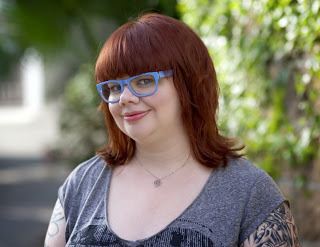 Photographer credit: Jessie WeinbergToday I'm so pleased to feature the delightful, the funny, the friendly, the awesome AMY SPALDING! Author of THE REESE MALCOLM LIST and INK IS THICKER THAN WATER, Amy is an amazing contemp author that you should definitely have your sights on.
Photographer credit: Jessie WeinbergToday I'm so pleased to feature the delightful, the funny, the friendly, the awesome AMY SPALDING! Author of THE REESE MALCOLM LIST and INK IS THICKER THAN WATER, Amy is an amazing contemp author that you should definitely have your sights on. Check out her interview below, and don't forget to enter the contest for a free copy of her latest book!
You can stalk Amy here:Author WebsiteTwitter: @theamesFacebookTumblr
YOU
We can read all about your life from your bio in the jacket flap of your book. So, what's a completely random fact about you that most people don't know? Once I was dining at a Cracker Barrel in Kentucky, and a waitress told me I looked like someone famous. Obviously I was very flattered, even though she couldn’t figure out whom for nearly the entire meal. But then she announced she’d solved the riddle: “You look like a cartoon bear!” Thank you?
As a kid, what was your favorite book? Have your tastes changed since growing up? Some of my favorite books growing up were two series: Betsy Tacy by Maud Hart Lovelace, and The Babysitters Club by Ann M. Martin. Both were about tight groups of friends just dealing with each other, their friends, and—to some extent—boys. The book from my childhood that remains a favorite to this day is A Summer to Die by Lois Lowry. I recommend it to everyone.
I think my tastes have stayed fairly consistent, actually, though these days I’ve really gotten into nonfiction as well, which was never a love growing up. I just went through a phase of reading a bunch about cults and other creepy groups of people.
In your book, THE REECE MALCOM LIST, Devan’s mother Reece is a NY Times Bestselling author. Did you slip in any writer quirks that you have in her character? The funny thing is I didn’t think “make her seem like a writer”, I mainly thought, “make her seem intimidating and standoffish”—but it turns out? Someone who holes away in an office and doesn’t always like to talk to other people? Kiiiiiinda seems like a lot of writers. Also, of course, her favorite beverages are coffee and bourbon.
Beth's note: The beverage choice is an excellent point.
YOUR BOOK
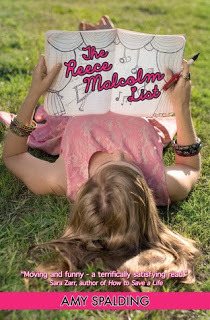
It's the inevitable question: what inspired THE REECE MALCOM LIST and INK IS THICKER THAN WATER? For The Reece Malcolm List, I’d always been obsessed with long-lost family stories, so I thought if I really wanted to read my ideal one, I should just write my own. I loved the idea of Reece being someone Devan would have already heard of, which is why I made her a bestselling author. Since I wanted Devan to have something she was incredibly gifted at that had nothing to do with her mother’s talent, I ended up making her killer at show choir and musical theatre.
For Ink Is Thicker than Water, I was reading a lot and thinking about how many books are about something really dramatic shifting in one’s life. But a lot of what I’d gone through as a teenager, and even then as an adult, was how often life shifts around you, and you have to figure out how you stay afloat.
One of the things that stood out to me in both your novels was the way the families were not the traditional nuclear family of mom, dad, and 2.5 kids. Can you talk a little more about the way you portray such realistic families? Since with Reece my goal was to write about long-lost family, I knew I obviously wouldn’t be writing a typical family. But I didn’t approach writing Devan, her mom, and her mom’s boyfriend (or the memory of her dad and stepmother) as THIS FAMILY IS VERY DIFFERENT! I just focused on who each character was and therefore how they related to one another. The family is really being built in the book; and Devan and Reece really don’t have a guideline for how it should look—or at least a guideline they’re comfortable with. So their family dynamic grew out of how they and Brad, Reece’s boyfriend, assembled it.
With Ink, it’s funny to me how on one hand it’s definitely NOT a nuclear family. Kellie’s parents are divorced. Her mom is remarried, and with her new husband has a young son. Her dad has a girlfriend, though not one he’s very open about. Also, Kellie’s older sister was adopted. Aaaaand Kellie’s mom and stepdad own a tattoo shop.
But on the other hand, they actually conform to a lot of really traditional family notions. Kellie’s mom is obsessed with her, her husband, and the kids all eating as family. The kids are just siblings; there’s no emphasis on Sara’s adoption or Finn technically being a half-brother. And even after a divorce, clearly both parents want the best for both of their kids.
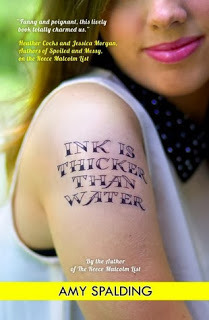 Can you tell us a little bit about the process--particularly the timeline--of writing & publishing your books?
I wrote Reece many, many years ago. It was kind of awful; the characters were there but there wasn’t really a plot—just stuff happening. (Apparently that’s not the same!) I worked hard on consuming a lot of YA, and reading agent/editor blogs, and decided to write something new. That became Ink. I felt pretty confident about it, so I began querying agents. This was toward the end of 2008. I had to go through a round of revisions based off of an agent’s notes, and by early 2009 I’d completed those revisions and resubmitted to the agents who were interested. My current agent Kate Testerman was one of those who offered, and after a lot of research, I signed with her.
Can you tell us a little bit about the process--particularly the timeline--of writing & publishing your books?
I wrote Reece many, many years ago. It was kind of awful; the characters were there but there wasn’t really a plot—just stuff happening. (Apparently that’s not the same!) I worked hard on consuming a lot of YA, and reading agent/editor blogs, and decided to write something new. That became Ink. I felt pretty confident about it, so I began querying agents. This was toward the end of 2008. I had to go through a round of revisions based off of an agent’s notes, and by early 2009 I’d completed those revisions and resubmitted to the agents who were interested. My current agent Kate Testerman was one of those who offered, and after a lot of research, I signed with her.After revising a bit, Ink was submitted to many editors. It came very close to selling, but paranormal romance was the trend then, and it was hard to break through with contemporary realistic. In the meantime, I wrote Reece AGAIN! But this time I sort of knew what I was doing. My agent liked it, and after Ink didn’t sell, we went out with Reece.
It had a similar pattern, and honestly I was incredibly frustrated and depressed about the entire situation. My rejections were lovely. People really liked the books. They just didn’t think the marketplace was right to publish it.
In 2011, I began work on my third book (I’d worked on some others in the meantime, but nothing had really gelled), and I decided to go in a different direction. Instead of another family drama—which I loved—I decided to try writing a romantic comedy. I decided to try not to worry about the publishing industry, and just write something that took me out of my writing-related depression. And it worked! Kissing Ted Callahan (And Other Guys) is maybe the most fun I’ve ever had first-drafting a novel.
But before I could finish revising it? In early 2012, Reece and Ink both sold! At that point I’d really given up, so it was a really pleasant shock.
So this means I started writing really seriously in 2008, got an agent in 2009…and my first book came out in 2013. I am not naturally a patient person, but I’ve really learned to be.
If your reader could only take away one emotion, theme, or idea from INK IS THICKER THAN WATER, what would you want it to be? Don’t be afraid of change!
YOUR WRITING
What's the most surprising thing you've learned since becoming a writer? I think I thought at a certain point it would get easier, but most of it doesn’t. First-drafting is still hard. Revising is still brainfully painful. Editorial letters are still a little scary to read. Releasing a book into the wild is terrifying. But also hearing from people who love your books? Amazing and special each time.
Beyond the typical--never give up, believe in yourself--what would be the single best advice you'd like to give another writer? BE PATIENT! I am proof that this business can take forever. It will happen when it happens. It will be better because the timing lines up. Don’t worry about how old you are as a debut author. I am the age of decaying dust picked up by an ancient breeze, and it hasn’t hurt me at all.
What do you think are your strongest and weakest points in writing? Weakest for me is definitely the middle of my books. Every single one, I’ve had to rip apart and restructure, because I struggle moving forward, finding a momentum, getting to a climax. I just kinda let stuff happen. Luckily I’ve worked with great editors who spot this and get me on the right path.
As far as strongest, for me it’s my dialogue. I love writing dialogue, and I love making myself laugh or cry at what my characters say (or don’t say) to each other.
ABOUT AMY SPALDING:
Amy Spalding is also the author of The Reece Malcolm List. She grew up in St. Louis and now lives in Los Angeles with two cats and a dog. She works in marketing and does a lot of improv. Visit Amy’s website www.theamyspalding.com or on Twitter @theames.
AND NOW FOR THE GIVEAWAY!
To enter, just fill out the Rafflecopter below (or follow this link). One winner will get a copy of INK IS THICKER THAN WATER. Open internationally, wherever the book will ship via Book Depository.
a Rafflecopter giveaway

Published on December 20, 2013 18:42



